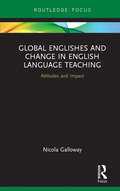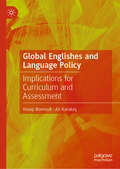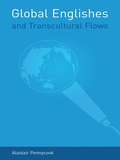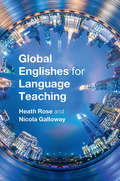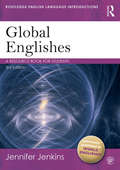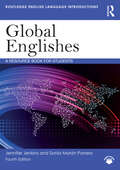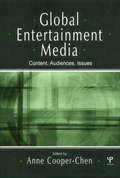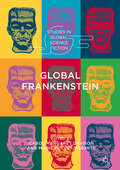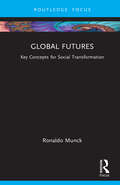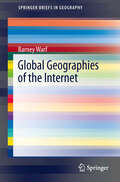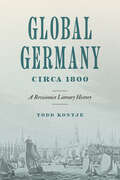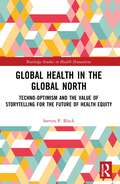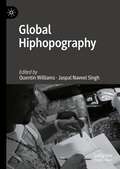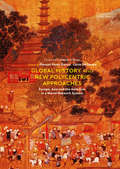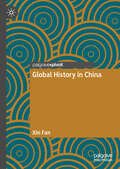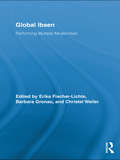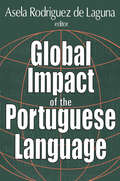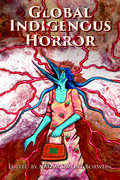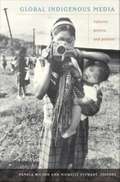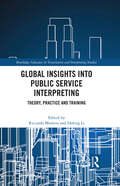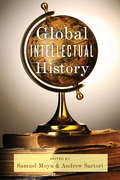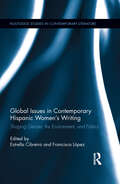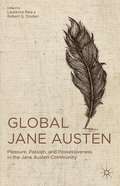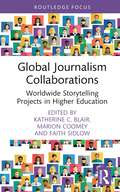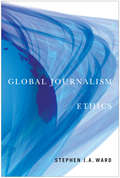- Table View
- List View
Global Englishes and Change in English Language Teaching: Attitudes and Impact (Routledge Focus on Linguistics)
by Nicola GallowayGlobal Englishes and Change in English Language Teaching analyses the impact of current ELT practice, bringing together research from the fields of Global Englishes and ELT to provide suggestions for the implementation of a Global Englishes for Language Teaching curriculum. Calling for a critical re-examination of ELT to ensure that classroom practice reflects how the English language functions as a lingua franca, this book: highlights that multilingualism, not monolingualism, is the norm in today's globalised world, and that 'non-native' English speakers far outnumber 'native' English speakers; showcases the author’s research into English language learner attitudes towards English and ELT in relation to Global Englishes; makes practical suggestions for pedagogical change within ELT. Global Englishes and Change in English Language Teaching is key reading for postgraduate students and researchers in the fields of TESOL/ELT and Global Englishes.
Global Englishes and Language Policy: Implications for Curriculum and Assessment
by Ali Karakaş Yusop BoonsukThis book provides a comprehensive exploration of the pedagogical implications of Global Englishes for language policy, curriculum design, and assessment. Drawing on current research and practice, the book offers practical guidance for language teachers and curriculum designers, examining the relationship between language policy and curriculum design, and highlighting the importance of assessment in the context of Global Englishes. Over the past few decades, English has emerged as a global lingua franca, used by speakers from diverse linguistic and cultural backgrounds to communicate with one another. However, many English language teachers and curriculum designers are still grappling with the practical implications of Global Englishes. This book addresses this gap and will be an essential resource for language teachers, as well as students and scholars in areas including Language Education, Applied Linguistics, TESOL and English Language Teaching.
Global Englishes and Transcultural Flows
by Alastair PennycookThe English language is spreading across the world, and so too is hip-hop culture: both are being altered, developed, reinterpreted, reclaimed. This timely book explores the relationship between global Englishes (the spread and use of diverse forms of English within processes of globalization) and transcultural flows (the movements, changes and reuses of cultural forms in disparate contexts). This wide-ranging study focuses on the ways English is embedded in other linguistic contexts, including those of East Asia, Australia, West Africa and the Pacific Islands. Drawing on transgressive and performative theory, Pennycook looks at how global Englishes, transcultural flows and pedagogy are interconnected in ways that oblige us to rethink language and culture within the contemporary world. Global Englishes and Transcultural Flows is a valuable resource to applied linguists, sociolinguists, and students on cultural studies, English language studies, TEFL and TESOL courses.
Global Englishes for Language Teaching
by Heath Rose Nicola GallowayThe spread of English as a global language has resulted in the emergence of a number of related fields of research within applied linguistics, including English as an International Language, English as a Lingua Franca, and World Englishes. Here, Heath Rose and Nicola Galloway consolidate this work by exploring how the global spread of English has impacted TESOL, uniting similar movements in second language acquisition, such as translanguaging and the multilingual turn. They build on a number of concrete proposals for change and innovation in English language teaching practice, whilst offering a detailed examination of how to incorporate a Global Englishes perspective into the multiple faces of TESOL, putting research-informed practice at the forefront. Global Englishes for Language Teaching is a ground-breaking attempt to unite discussions on the pedagogical implications of the global spread of English into a single text for researchers and practicing teachers.
Global Englishes: A Resource Book for Students (Routledge English Language Introductions)
by Jennifer JenkinsRoutledge English Language Introductions cover core areas of language study and are one-stop resources for students. Assuming no prior knowledge, books in the series offer an accessible overview of the subject, with activities, study questions, sample analyses, commentaries, and key readings - all in the same volume. The innovative and flexible 'two-dimensional' structure is built around four sections - introduction, development, exploration, and extension - which offer self-contained stages for study. Each topic can also be read across these sections, enabling the reader to build gradually on the knowledge gained. Global Englishes, Third Edition, previously published as World Englishes, has been comprehensively revised and updated and provides an introduction to the subject that is both accessible and comprehensive. Key features of this best-selling textbook include: coverage of the major historical, linguistic, and sociopolitical developments in the English language from the start of the seventeenth century to the present day exploration of the current debates in global Englishes, relating to its uses as mother tongue in the US, UK, Antipodes, and post-colonial language in Africa, South and Southeast Asia, and lingua franca across the rest of the globe, with a new and particularly strong emphasis on China a range of texts, data and examples draw from emails, tweets and newspapers such as The New York Times, China Daily and The Straits Times readings from key scholars including Alastair Pennycook, Henry G. Widdowson and Lesley Milroy activities that engage the reader by inviting them to draw on their own experience and consider their orientation to the particular topic in hand. Global Englishes, Third Edition provides a dynamic and engaging introduction to this fascinating topic and is essential reading for all students studying global Englishes, English as a lingua franca, and the spread of English in the world today.
Global Englishes: A Resource Book for Students (Routledge English Language Introductions)
by Jennifer Jenkins Sonia Morán PaneroRoutledge English Language Introductions cover core areas of language study and are one-stop resources for students. Assuming no prior knowledge, books in the series offer an accessible overview of the subject, with activities, study questions, sample analyses, and commentaries.Global Englishes, Fourth Edition has been fully revised and updated and provides an introduction to the subject that is both accessible and comprehensive.Key features of this best-selling textbook include:• coverage of the major historical, linguistic, and sociopolitical developments in the English language from the start of the seventeenth century to the present day;• exploration of the current debates in Global Englishes, relating to its uses as a post-colonial language in Asia and Africa, a mother tongue in the US, UK, and Antipodes, and lingua franca across the globe, with a strong emphasis on China;• new material on Latin America, English as a lingua franca, and English medium instruction;• a range of texts, data, and examples drawn from emails, tweets, and newspapers;• readings from key scholars including Alastair Pennycook, Henry Widdowson, and Lesley Milroy;• updated online support material providing additional materials that are closely linked to each unit of the book.Global Englishes, Fourth Edition provides a dynamic and engaging introduction to this fascinating topic and is essential reading for all students studying global Englishes more broadly, English as a Lingua Franca specifically, and the factors involved in the spread of English in the world today.
Global Entertainment Media: Content, Audiences, Issues (Routledge Communication Series)
by Anne Cooper-ChenGlobal Entertainment Media offers a unique perspective on entertainment media worldwide. As one of the first comprehensive books to address entertainment mass media worldwide, it addresses students as TV watchers and takes them to new places, both geographically and intellectually. Editor Anne Cooper-Chen has gathered an international group of scholars to explore such concepts as psychology, gratifications, and effects of media entertainment and its relation to national cultures, as well as to discuss the business of international TV trade by transnational media corporations.In this volume, experts discuss the content, audiences, and cultural and legal aspects of their respective countries, all of which are major TV markets. The country-specific chapters draw on the individual insights, expertise, and currency of 10 resident authors. Contributions represent every hemisphere of the globe, offering detailed examinations of media entertainment in United Kingdom, Germany, Egypt, Nigeria, South Africa, India, Japan, China, Brazil, and Mexico. The two concluding chapters provide cross-national case studies that look at familiar TV experiences--The Olympics and the "Who Wants to Be a Millionaire" show--in global and novel ways.Global Entertainment Media is intended for students in international media, comparative media, cross-cultural communication, and television studies, and it also has much to offer scholars and researchers in entertainment media.
Global Frankenstein (Studies in Global Science Fiction)
by Marie Mulvey-Roberts Carol Margaret DavisonConsisting of sixteen original essays by experts in the field, including leading and lesser-known international scholars, Global Frankenstein considers the tremendous adaptability and rich afterlives of Mary Shelley’s iconic novel, Frankenstein, at its bicentenary, in such fields and disciplines as digital technology, film, theatre, dance, medicine, book illustration, science fiction, comic books, science, and performance art. This ground-breaking, celebratory volume, edited by two established Gothic Studies scholars, reassesses Frankenstein’s global impact for the twenty-first century across a myriad of cultures and nations, from Japan, Mexico, and Turkey, to Britain, Iraq, Europe, and North America. Offering compelling critical dissections of reincarnations of Frankenstein, a generically hybrid novel described by its early reviewers as a “bold,” “bizarre,” and “impious” production by a writer “with no common powers of mind”, this collection interrogates its sustained relevance over two centuries during which it has engaged with such issues as mortality, global capitalism, gender, race, embodiment, neoliberalism, disability, technology, and the role of science.
Global Futures: Key Concepts for Social Transformation (Routledge Critical Development Studies)
by Ronaldo MunckGlobal Futures: Key Concepts for Social Transformation provokes us to rethink some of the key words and concepts which define the current global order. Prompted by crises around the world, it seeks to re-energise our desire for a better future.The book takes seven key concepts from the new global studies and considers how they are used and whether they are adequate for addressing the twenty-first century's increasingly complex global order. The topics covered include widely used concepts such as development, modernity, history, and politics, as well as more unusual themes such as desire, complexity, and alternative futures. The core message of this book is that we need to grasp the complex and contradictory reality behind these important concepts in order to foster a new way of thinking, seeing, and acting for a future fit for human purpose.Written by Ronaldo Munck, a key social theorist and social activist with a Latin American and European background, this book will be perfect for students and researchers of sociology, politics, international relations, and global development.
Global Geographies of the Internet
by Barney WarfToday, roughly 2 billion people use the internet, and its applications have flourished in number and importance. This volume will examine the growth and geography of the internet from a political economy perspective. Its central motivation is to illustrate that cyberspace does not exist in some aspatial void, but is deeply rooted in national and local political and cultural contexts. Toward that end, it will invoke a few major theorists of cyberspace, but apply their perspectives in terms that are accessible to readers with no familiarity with them. Beyond summaries of the infrastructure that makes the internet possible and global distributions of users, it delves into issues such as the digital divide to emphasize the inequalities that accompany the growth of cyberspace. It also addresses internet censorship, e-commerce, and e-government, issues that have received remarkably little scholarly attention, particularly from a spatial perspective. Throughout, it demonstrates that in cyberspace, place matters, so that no comprehensive understanding of the internet can be achieved without considering how it is embedded within, and in turn changes, local institutional and political contexts. Thus the book rebuts simplistic "death of distance" views or those that assert there is, or can be, a "one-size-fits-all, cookie-cutter" model of the internet applicable to all times and places.
Global Germany Circa 1800: A Revisionist Literary History (Max Kade Research Institute)
by Todd KontjeGlobal Germany Circa 1800 asks two interrelated questions: How did Germans participate in the European conquest of the world, and how were they different from other imperial powers? In other words, what is the relation between the German form of empire, the old Reich, and the modern European empires that emerged in the global age?In this book, Todd Kontje presents a revisionist literary and intellectual history, inviting readers to consider how we might understand “Germany” at the turn of the nineteenth century if we remove the nation-state as the inevitable goal of cultural and political development. Focusing on the pivotal years around 1800, when many of the concepts that define the modern era first came into being, Kontje investigates how thinkers in and around Weimar—from Goethe, Schiller, and Kant to Georg Forster, Heinrich von Kleist, and Alexander von Humboldt—worked within existing political structures to make sense of the region’s place in the world. Ultimately, he reveals how Weimar, a remote artist hub long thought to exemplify the insularity of a soon-to-be-unified nation, was in fact utterly worldly, and in a manner very different from the political capitals of imperial nation-states like London and Paris.Accessible and entertaining, this literary history is essential reading for German studies students and scholars, and it will appeal to audiences in world history, empire studies, intellectual history, and comparative literature.
Global Health in the Global North: Techno-Optimism and the Value of Storytelling for the Future of Health Equity (Routledge Studies in Health Humanities)
by Steven P. BlackThis book investigates how health interventions are imagined into being in high-income countries, drawing on over seven years of fieldwork in the self-described “global health capital” Atlanta to consider the role of storytelling in the construction of global health futures.The volume highlights the ways in which scientific storytelling is critical to our understanding of how global health futures are constructed. The book examines three value types—epistemic, ethical, and economic—central to contemporary global health and three linguistic and communicative phenomena—multimodal poetics, emplotment, and discursive circulation—significant to the constitution of these values through storytelling. In spotlighting the Atlanta metropolitan region, home to a number of prominent organizations and figures in the development of global health, the book showcases deeper insights into the future-oriented and techno-optimistic stories global health professionals tell each other, funders, and the public. Black builds on these discussions to suggest ways forward for these stories to be improved to foster greater equity and decolonization and re-imagine the future of global health.This book will be of interest to students and scholars in linguistic anthropology, medical anthropology, global health, and health humanities.
Global Hiphopography
by Quentin Williams Jaspal Naveel SinghThis book brings together a range of hip hop scholars, artists and activists working on Hip Hop in the Global North and South with the goal of advancing Hiphopographic research as a critical methodology with critical fieldwork methods that can provide a critical perspective of our world. The authors’ focus in this volume is to present an anthology of essays that expand the remit of Hiphopography as an approach to the study of Hip Hop that is not only sensitive to the social, economic, political and cultural lives of Hip Hop Culture participants as interpreters and theorists, but one that continues to humanize the “whole person” behind the decks, on the mic, rocking on the linoleum floor, painting in front of a wall, and seeking that Knowledge of Self. This book will be relevant to Hip Hop scholars in fields such as cultural studies and history, sociolinguistics, linguistic anthropology and ethnography, and race studies, while Hip Hop heads themselves will find parts of this book that represent their culture in ethical and informative ways.
Global History and New Polycentric Approaches: Europe, Asia and the Americas in a World Network System (Palgrave Studies in Comparative Global History)
by Manuel Perez Garcia Lucio De SousaThis book is open access under a CC BY 4. 0 license. Rethinking the ways global history is envisioned and conceptualized in diverse countries such as China, Japan, Mexico or Spain, this collections considers how global issues are connected with our local and national communities. It examines how the discipline had evolved in various historiographies, from Anglo Saxon to southern European, and its emergence in Asia with the rapid development of the Chinese economy motivation to legitimate the current uniqueness of the history and economy of the nation. It contributes to the revitalization of the field of global history in Chinese historiography, which have been dominated by national narratives and promotes a debate to open new venues in which important features such as scholarly mobility, diversity and internationalization are firmly rooted, putting aside national specificities. Dealing with new approaches on the use of empirical data by framing the proper questions and hypotheses and connecting western and eastern sources, this text opens a new forum of discussion on how global history has penetrated in western and eastern historiographies, moving the pivotal axis of analysis from national perspectives to open new venues of global history.
Global History in China
by Xin FanThis book explores global history as an emerging field of scholarly studies in China today. Readers are invited to rethink the origin of global history in China and to examine its current state. Chinese scholarship is rooted in a warm appreciation of globalization in the age of Opening-up and Reform and presented as a trendy transnational intellectual movement at the opening of the twenty-first century. On the one hand, global history claims an identity of the “new” eager to criticize the Eurocentric bias embedded in the narratives of the “old,” ones from world history; on the other hand, as an emerging field, it is yet to face competitions from national histories and area studies, which are nurtured by latest state initiatives with outspoken political agendas. As a whole, global history captures Chinese scholars’ tenacious interest in studying globalization through the lens of history. This book will interest historians, China scholars, and those trying to grasp the “Chinese perspective” on the world.
Global Ibsen: Performing Multiple Modernities (Routledge Advances in Theatre & Performance Studies)
by Erika Fischer-LichteIbsen’s plays rank among those most frequently performed world-wide, rivaled only by Brecht, Chekhov, Shakespeare, and the Greek tragedies. By the time Ibsen died in 1906, his plays had already conquered the theaters of the Western world. Inviting rapturous praise as well as fierce controversy, they were performed in Europe, North America, and Australia, contributing greatly to the theater, culture, and social life of these continents. Soon after Ibsen’s death, his plays entered the stages of East Asia - Japan, China, Korea - as well as Africa and Latin America. . But while there exist countless studies on Ibsen the dramatist and the significance of his plays within different cultures written mainly by literary scholars, none of them examine the ways in which Ibsen's plays were performed, or the impact of such performances on the theater, social life, and politics of these cultures. In Global Ibsen, contributors look at the way performances of Ibsen's plays address problems typical to modern societies all over the world, including: the inferior social status of women, the decay of bourgeois family life and values, religious fundamentalism, industrial pollution and corporate cover-up, and/or the loss of and search for identity.
Global Impact of the Portuguese Language
by Asela Rodriguez de LagunaWithin the cultural and literary context of contemporary Portugal and Western literature, 1998 was unquestionably the year that Portuguese writing gained international recognition as JosU Saramago became the first Portuguese writer ever to receive the Nobel Prize in literature. Readers who had never thought about Portuguese letters began to consume his books and, most importantly, opted for expanding their reading lists to include other important writers not only from Portugal, but from Portuguese-speaking well beyond the borders of Portugal. Global Impact of the Portuguese Language is a collection of Portuguese writing that is as rich in content and broad in scope as the diversity of its topics and writing modes of its contributors. The book is divided into three major parts. Part 1, "Different Cultural Perspectives of Portuguese Writing," contains thirteen chapters in which the first and opening one, "Portugal: The New Frontier" ably sets the stage for the book by examining from a cultural perspective how Portugal, a peripheral country in the new world system, serves as a microcosm of the problems of cultural intercommunication in today's world. Subsequent chapters are grouped in three categories: "The Voices of the Writers," "Critical Approaches to Cames," and "Fictionalizing the Nation." Part 2, "Portuguese Language and Literature Outside Portugal," comprises one section devoted to the Portuguese language in Africa, followed by studies about Portuguese discoveries as part of the historical process of remembering and forging one's identity, and finally a comprehensive historical development of Portuguese writing, both in Portuguese and English, in the United States. Part 3, "Portuguese Literature and Criticism Available in English: Suggested Readings" details the recent literary happenings which point to a possible renaissance in Portuguese literary production. The concluding part of this volume offers a short, comprehensive listing of anthologies, general studies, and the most popular translations of the best of Portuguese writing from Portugal and Africa. This lively volume constitutes a first pioneering effort to contribute to a deepening appreciation and understanding of Portuguese writing. Anyone interested in ethnic writing will find this book an invaluable education resource with which to begin an exploration of Portuguese writing in the United States. Asela Rodriguez de Laguna is associate professor of Spanish and director of the Hispanic Civilization & Language Studies Program. She is the author of Notes on Puerto Rican Literature: Images and Identities: An Introduction, and editor of Images and Identities: The Puerto Rican in Two World Contexts.
Global Indigenous Horror (Horror and Monstrosity Studies Series)
by Naomi Simone BorweinContributions by Katrin Althans, Jayson Althofer, Naomi Simone Borwein, Persephone Braham, Krista Collier-Jarvis, Shane Hawk, Jade Jenkinson, June Scudeler, and Sabrina ZachariasGlobal Indigenous Horror is a collection of essays that positions Indigenous Horror as more than just a genre, but as a narrative space where the spectral and social converge, where the uncanny becomes a critique, and the monstrous mirrors the human. While contentions swirl around the genre category, this exploratory anthology is the first critical edited collection dedicated solely to ways of theorizing and analyzing Indigenous Horror literature. The essays, curated by scholar Naomi Simone Borwein, ask readers to consider what Global Indigenous Horror is—and to whom. The volume opens with a preface by international bestselling horror writer Shane Hawk (enrolled Cheyenne-Arapaho, Hidatsa, and Potawatomi descent), followed by an overview of Global Indigenous Horror trends, aesthetics, and approaches. The carefully selected contributions explore Indigenous Horror literature and mixed-media narratives worldwide, unraveling the intricate dynamics between the local and global, traditional and contemporary, and human and monstrous. Contributor chapters are grouped not by geographical or cultural variation, but along a spectrum, from a strong emphasis on ways of knowing to a critical inspection of Horror through Indigenous Gothic aesthetics across cultural boundaries and against and beyond nation states.
Global Indigenous Media: Cultures, Poetics, and Politics
by Pamela Wilson Michelle StewartIn this exciting interdisciplinary collection, scholars, activists, and media producers explore the emergence of Indigenous media: forms of media expression conceptualized, produced, and created by Indigenous peoples around the globe. Whether discussing Maori cinema in New Zealand or activist community radio in Colombia, the contributors describe how native peoples use both traditional and new media to combat discrimination, advocate for resources and rights, and preserve their cultures, languages, and aesthetic traditions. By representing themselves in a variety of media, Indigenous peoples are also challenging misleading mainstream and official state narratives, forging international solidarity movements, and bringing human rights violations to international attention. Global Indigenous Media addresses Indigenous self-representation across many media forms, including feature film, documentary, animation, video art, television and radio, the Internet, digital archiving, and journalism. The volume's sixteen essays reflect the dynamism of Indigenous media-making around the world. One contributor examines animated films for children produced by Indigenous-owned companies in the United States and Canada. Another explains how Indigenous media producers in Burma (Myanmar) work with NGOs and outsiders against the country's brutal regime. Still another considers how the Ticuna Indians of Brazil are positioning themselves in relation to the international community as they collaborate in creating a CD-ROM about Ticuna knowledge and rituals. In the volume's closing essay, Faye Ginsburg points out some of the problematic assumptions about globalization, media, and culture underlying the term "digital age" and claims that the age has arrived. Together the essays reveal the crucial role of Indigenous media in contemporary media at every level: local, regional, national, and international. Contributors: Lisa Brooten, Kathleen Buddle, Cache Collective, Michael Christie, Amalia Crdova, Galina Diatchkova, Priscila Faulhaber, Louis Forline, Jennifer Gauthier, Faye Ginsburg, Alexandra Halkin, Joanna Hearne, Ruth McElroy, Mario A. Murillo, Sari Pietikinen, Juan Francisco Salazar, Laurel Smith, Michelle Stewart, Pamela Wilson
Global Insights into Public Service Interpreting: Theory, Practice and Training (Routledge Advances in Translation and Interpreting Studies)
by Riccardo MorattoThis edited volume sets out to explore interdisciplinarity issues and strategies in Public Service Interpreting (PSI), focusing on theoretical issues, global practices, and education and training. Unlike other types of interpreting, PSI touches on the most private spheres of human life, making it all the more imperative for the service to move towards professionalization and for ad hoc training methods to be developed within higher institutions of education. PSI is a fast-developing area which will assume an increasingly important role in the spectrum of the language professions in the future. An international, dynamic and interdisciplinary exploration of matters related to PSI in various cultural contexts and different language combinations will provide valuable insights for anyone who wishes to have a better understanding when working as communities of practice. For this purpose, the Editors have collected contributions focusing on training, ethical issues, professional deontology, the role and responsibilities of interpreters, management and policy, as well as problems and strategies in different countries and regions. This collection will be a valuable reference for any student or academic working in interpreting, particularly those focusing on Public Service Interpreting anywhere in the world.
Global Intellectual History (Columbia Studies in International and Global History)
by Samuel Moyn Andrew SartoriWhere do ideas fit into historical accounts that take an expansive, global view of human movements and events? Teaching scholars of intellectual history to incorporate transnational perspectives into their work, while also recommending how to confront the challenges and controversies that may arise, this original resource explains the concepts, concerns, practice, and promise of "global intellectual history," featuring essays by leading scholars on various approaches that are taking shape across the discipline.The contributors to Global Intellectual History explore the different ways in which one can think about the production, dissemination, and circulation of "global" ideas and ask whether global intellectual history can indeed produce legitimate narratives. They discuss how intellectuals and ideas fit within current conceptions of global frames and processes of globalization and proto-globalization, and they distinguish between ideas of the global and those of the transnational, identifying what each contributes to intellectual history. A crucial guide, this collection sets conceptual coordinates for readers eager to map an emerging area of study.
Global Issues in Contemporary Hispanic Women's Writing: Shaping Gender, the Environment, and Politics (Routledge Studies in Contemporary Literature)
by Estrella Cibreiro Francisca LópezThis collection explores the contributions of Hispanic women writers to ongoing Western debates on gender, power, ethics, and the environment, offering a wide range of essays that specifically portray the ways in which contemporary writers focus on issues of global impact in a deliberate and purposeful manner. The contributors analyze texts pertaining to all literary genres, examining a myriad of ethical, philosophical, and political perspectives including feminism, postcolonial theories, cultural and gender studies, information age studies, and ecofeminism. The book visits continuities and discontinuities among Spanish and Latin American women with regards to the ways in which they approach writing as a political weapon: to express ecological concerns; to denounce social injustice; to re-articulate existing paradigms, such as local versus global, violence versus pacifism, immigrant versus citizen; and to raise consciousness about racist, sexist, and other discriminatory practices. Such use of writing as an instrument of ethical and political exploration is underlined throughout the different articles in the volume as the authors emphasize pluralism, social justice, gender equality, tolerance, and political representation. This book offers readers a broad perspective on the multiple ways in which Hispanic women writers are explicitly exploring the social, political, and, economic realities of our era and integrating global perspectives and gender concerns into their writing, highlighting the unprecedented level of sociopolitical engagement practiced by 20th and 21st century Hispanic women writers.
Global Jane Austen
by Laurence Raw Robert G. DrydenDespite dying in relative obscurity, Jane Austen has become a global force as different readers across time, space, and media have responded to her work - beyond simply American and Great Britain, there are Janeites to be found in China, India, and across the globe. Many fans feel they have developed a personal relationship with Austen and her work. This volume examines the ways in which her novels affect individual psychologies and how Janeites in both the English and non-English speaking worlds experience her work, from visiting her home, to public re-enactments, to films based on her writings.
Global Journalism Collaborations: Worldwide Storytelling Projects in Higher Education (Routledge Focus on Journalism Studies)
by Katherine C. BlairGlobal Journalism Collaborations offers guidance on detailed ways to create collaborative international projects in the communications and journalism fields – a hot topic in higher education.The chapters are contributed by professors and journalists from around the world. The authors explain, step-by-step, the process of collaborating with students and instructors at universities in dozens of countries in order to produce digital storytelling projects that are streamed worldwide. The book will inspire academics and students in any discipline to develop and create their own collaborative projects by sharing lessons learned through case studies of successful global collaborations.This truly interdisciplinary work will interest scholars and instructors of journalism, media studies, mass communication, higher education and anyone working on collaborative projects across a variety of disciplines.
Global Journalism Ethics
by Stephen J.A. WardStephen Ward argues that present media practices are narrowly based within the borders of single country and thus unable to successfully inform the public about a globalized world. Presenting an ethical framework for work in multimedia, the author extends John Rawl's theories of justice and the human good to redefine the aims for which journalism should strive and then applies this new foundation to issues such as the roles of patriotism and objectivity in journalism. An innovative argument that presents a necessary corrective to contemporary media practices, Global Journalism Ethics is a theoretically rich study for journalists on the air, in print, and on the internet.
